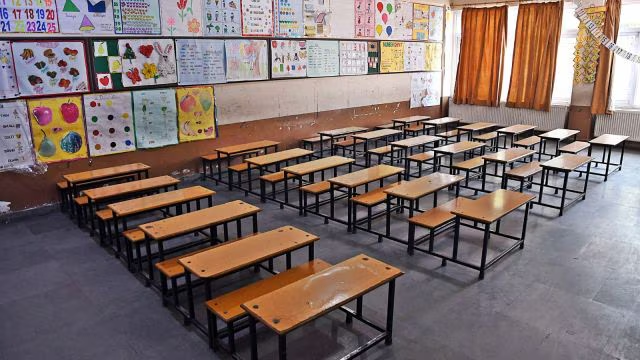DELHI SCHOOLS went online on Friday, becoming part of an increasing number of schools in northern India that have put physical classes on hold in the wake of increased tensions after India’s Operation Sindoor. The air strikes against terrorist camps in Pakistan and Pakistan-occupied Kashmir, launched on Wednesday in retaliation for the April 22 Pahalgam terror attack, have led to widespread precautionary actions in education systems, especially in border states.
A number of Delhi schools, both government and private, declared that classes would go online for at least the next two days to guarantee student safety while ensuring academic continuity. The decision comes in sync with similar actions in Jammu and Kashmir, Punjab, Rajasthan, and Ladakh, where authorities have either temporarily closed or transitioned institutions to digital platforms owing to security threats following retaliatory shelling from the other side of the Line of Control (LoC).
In the Jammu and Kashmir Union Territory, the state government directed the closure of all universities, colleges, and schools until Saturday. Consequently, most institutions have turned to online classes to prevent academic interruption. News agency PTI informed that the schools in the region started online classes on Friday, keeping students occupied despite the intensifying crisis.
Chief Minister Omar Abdullah spoke on the issue on Thursday night, saying that the state government would reconsider the situation on Monday before making a decision to reopen schools. In the meantime, the Leh district administration declared a blanket closure of all educational institutions until the weekend as a precautionary measure.

Why have Delhi schools and others across India decided to go online during Operation Sindoor fallout?
The phrase Delhi schools has become key to the broader story around academic adaptation during this period of national strain. Institutions are trying to balance protection for students and continuity in education, especially in the wake of possible future escalations on the India-Pakistan border.
In Rajasthan, the government has directed suspension of classes in government and private schools in the border districts of Sri Ganganagar, Bikaner, Jodhpur, Jaisalmer, and Barmer. The action also involves closure of all colleges in Jodhpur, reflecting the seriousness with which local governments are taking possible threats. High alert has been raised in these districts, and officials enforced blackout measures from midnight to 4 a.m. on Friday to neutralize the threat of aerial attacks.
Punjab has also taken strict measures. The state government declared total closure of all educational institutions for the next three days. District administrations of Pathankot, Amritsar, Fazilka, and Gurdaspur have done the same. Schools and colleges have been directed to close until Sunday, with extensions subject to further developments.
Simultaneously, the Tricity area — Chandigarh, Mohali, and Panchkula — also directed Friday and Saturday closures. In Panchkula, officials of the Haryana government widened the shutdown to cover all colleges and universities. Panjab University rescheduled all exams for May 9, 10, and 12. University officials stated new dates for the exams would be announced later when the security situation improves.
The wave of school closures was prompted by the Indian Armed Forces’ launch of Operation Sindoor early on Wednesday, targeting nine terror camps run by outfits such as Jaish-e-Mohammad and Lashkar-e-Taiba in Pakistan and PoK. The attacks were launched in retaliation for a gruesome terror attack on an Indian Army convoy in Pahalgam on April 22.
After Operation Sindoor, Pakistan responded with massive shelling along the border areas of Jammu and Kashmir, especially in Poonch and Uri. Indian officials attested that a minimum of 14 civilians were killed and dozens were injured in the Pakistani offensive. Civilians’ infrastructure, such as schools and houses, was greatly damaged, leaving thousands to evacuate their villages and migrate to safer zones.
Early on Friday morning, India also intercepted a Pakistani missile and drone attack that targeted 15 Indian military facilities and several cities. This development further highlighted the precarious nature of the current state of geopolitics and elicited renewed vigilance from education authorities.
Delhi schools have previously suffered disruptions by way of various emergencies, from peaks in pollution to waves of COVID-19. But this time the transition to online learning has been prompted by external armed threats rather than health or environmental issues, for a rare but understandable reason to ensure the safety of students and faculty.
Education experts maintain that such rapid adaptability during crises reduces long-term academic consequences. “Going online in war zones, even temporarily, prevents learning gaps. It also assures parents that education goes on in a secure environment,” said a senior Delhi education department official.
Though there is no word officially as of now on when physical classes in Delhi will start again, the school administrators are keeping a close eye on advisories from the Ministry of Home Affairs and the Ministry of Education. Some principals verified that plans have been made for extending the online mode of learning next week in case the tensions continue.
The Education Ministry, with the concurrence of the corresponding state governments, will come out with a national directive by Sunday night after analyzing changing intelligence and military briefs.
Meanwhile, Delhi schools, thousands of northern India schools, continue in a condition of vigilant apprehension — desirous of de-escalation, yet poised for continuity via online methods.
ALSO READ
“Delhi Government on Shocking Fee Violations in 1,600 Private Schools”
How Delhi schools are cleaning up Yamuna water now
https://indianexpress.com/article/political-pulse/pushkar-dhami-uttarakhand-india-pakistan-9993069